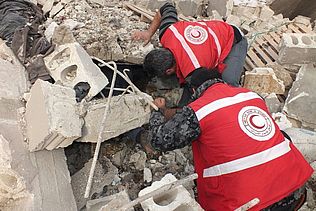When the earthquake struck Haiti on 12 January 2010 the capital Port-au-Prince was almost totally destroyed and over 250,000 people lost their lives. In the midst of such an apocalyptic nightmare, emergency aid provided by Haiti's neighbours provided a ray of hope. In addition to the solidarity Haitians showed through numerous examples of self-help, neighbouring Dominican Republic also provided assistance. One of the organisations supported by medico international using funds raised in Germany was the Dominican health association Cosalup. As part of the ‘Ayuda Haiti’ network it was in charge of basic healthcare at emergency shelters in Léogâne, where volunteer doctors and care workers maintained a health supply chain for several weeks. medico has known Cosalup for many years through the health activist networks in Latin America. Like medico, it is a member of the People’s Health Movement.
This was the first project funded by medico in Haiti and the approach adopted in it remains an important feature of medico’s programming to this day. medico funded Guatemalan dental health promoters to undertake two missions to Léogâne, only to find that even this was not enough to cover basic needs. This gave us the idea of learning from other partners’ positive experiences in similar situations of exclusion and poverty.
Aid was also provided by a grassroots organisation in a rather more distant neighbour – Brazil. The Landless People’s Movement in Haiti has links with the Landless People’s Movement in Brazil (MST) through the Via Campesina network and medico has been working with the Brazilians for several years. We are now providing funding to train Haitian peasant activists at MST’s training centre in Brazil. They attend courses ranging from organic farming to political training, learning practical ways of advocating for their rights and political action.
The aim is to strengthen Haitian grassroots organisations and civil society structures in order to provide support not only for rebuilding infrastructure but also for political and social (re-) construction. These include the rural community-based organisation APDK, which is attempting to stave off the next disaster through an environmentally-friendly reforestation programme; the NGO CRESFED, which is setting up a participative community development scheme with the help of advisers from Benin; the Haitian-Dominican Women’s Organisation (AFDC), which has its origins in emergency aid but has also begun developing a long-term operational programme to support women’s rights in Haiti; and finally the Haitian human rights organisation RNDDH, whose aim is to monitor transparency and the rule of law during the national reconstruction and pursue abuses through the courts.
This approach arises directly from medico’s experience of humanitarian aid over a number of decades and its often ambivalent consequences for the victims, of which Haiti is a classic example. On the one hand, the presence of many NGOs – whose number has tripled since the earthquake – is needed to ensure the population’s basic humanitarian needs are met. On the other hand, they present a serious problem as they undermine the Haitian’s own capacities to recover and move on from the disaster. Medico is attempting to address this dilemma by actively encouraging public debate about the limits and responsibilities of international aid organisations and by strengthening South-South cooperation. This is something we have already had success with in other contexts.

